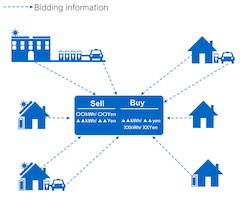Loading...
Loading...
Aiming for the efficient usage of electricity, the three parties will test a system for trading electricity between individuals by utilizing distributed power supplies such as solar panels, secondary batteries, and electrified vehicles.
 |
TOKYO, May 23, 2019 - (JCN Newswire) - The University of Tokyo (UTokyo), Toyota Motor Corporation, and TRENDE Inc., will jointly conduct tests, from June 17 at Toyota's Higashifuji Technical Center and the surrounding area, on a next-generation electricity system (P2P(1) electricity transactions) that enables homes, businesses, and electrified vehicles connected to the electricity grid to trade electricity using blockchain(2).
As distributed power supplies such as solar panels, secondary batteries, and electrified vehicles become increasingly widespread, Japan's electricity supply system is in a transitional state as it shifts from its traditional large-scale consolidated system to a distributed system by which individuals and businesses own their own power supply. The objective of the test is to verify the economic advantage of having prosumers(3), who generate electricity with their own distributed power supply, trade electricity with electricity consumers, via an electricity exchange market, at prices that reflect supply and demand conditions, and to assess the feasibility of a two-way, self-autonomous electricity supply system that allows direct trading with other prosumers.
Specific steps of the test include the establishment of an electricity exchange accessible by households and businesses participating in the test, and the installation of an AI-powered electricity management system (an electricity trading agent) in each household and business. The electricity trading agent places orders to buy and sell electricity in an electricity exchange based on electrical consumption and forecasts of electrical power to be generated by solar panels at households and businesses. Electricity transactions between individuals are implemented using a defined algorithm that matches buy and sell orders that are collected in the electricity exchange from each household and business.
This is the world's first(4) test for electricity trading between individuals that incorporates PHEVs as a distributed power supply, in addition to solar panels and secondary batteries. The test aims to verify the economic advantage of having electricity consumers and prosumers trade electricity through market transactions. It will also simulate electricity consignment fees based on distance(5), and verify an algorithm for predicting the electricity demands of electrified vehicles, which have varying electrical consumption levels based on cruising range.
(1) This is an abbreviation for Peer to Peer, which is a mechanism for executing transactions wherein each terminal, called a node, communicates directly on an equal basis, instead of being dependent on a specific server or client.
(2) This is also called distributed ledger technology, which is used to build inexpensive databases in which all network participants share the ledger information in order to make it resistant to unauthorized modification.
(3) This term was coined by merging the words "producer" and "consumer," and refers to an electricity consumer who is also a producer of electricity using self-owned power generation equipment.
(4) As of May 23, 2019. Research conducted by TRENDE.
(5) This is a scheme for varying electricity consignment fees based on the length of the electricity transmission and distribution distance.
About Toyota Motor Corporation
Toyota Motor Corporation (TMC) is the global mobility company that introduced the Prius hybrid-electric car in 1997 and the first mass-produced fuel cell sedan, Mirai, in 2014. Headquartered in Toyota City, Japan, Toyota has been making cars since 1937. Today, Toyota proudly employs 370,000 employees in communities around the world. Together, they build around 10 million vehicles per year in 29 countries, from mainstream cars and premium vehicles to mini-vehicles and commercial trucks, and sell them in more than 170 countries under the brands Toyota, Lexus, Daihatsu and Hino. For more information, please visit www.toyota-global.com.
Source: Toyota Motor Corporation
Contact:
Public Affairs Division Global Communications Department Toyota Motor Corporation Tel: +81-3-3817-9926
Copyright 2019 JCN Newswire . All rights reserved.
Loading...
Loading...
© 2024 Benzinga.com. Benzinga does not provide investment advice. All rights reserved.
Benzinga simplifies the market for smarter investing
Trade confidently with insights and alerts from analyst ratings, free reports and breaking news that affects the stocks you care about.
Join Now: Free!
Already a member?Sign in